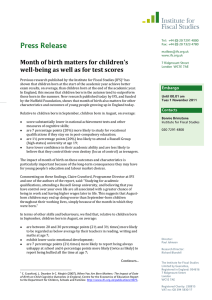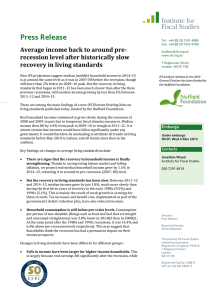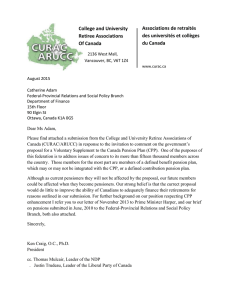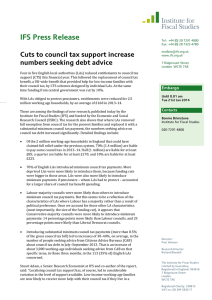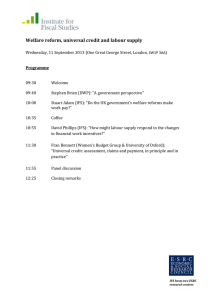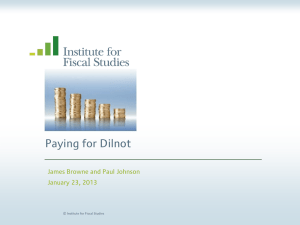Press Release Funding social care proposals may offer
advertisement
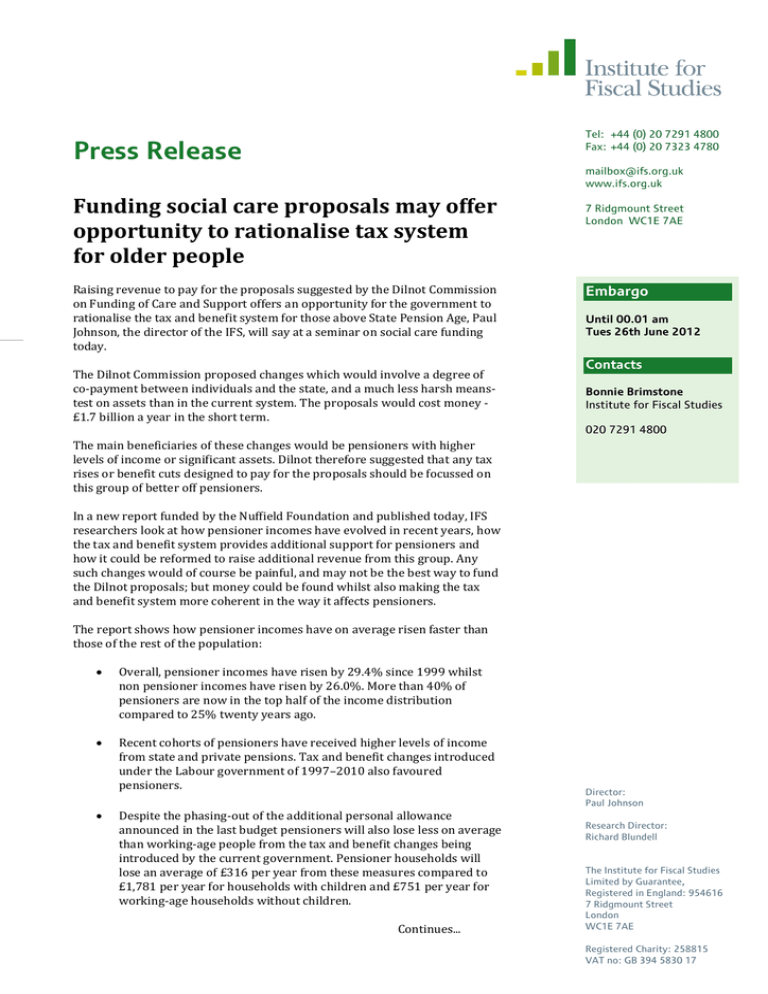
Tel: +44 (0) 20 7291 4800 Fax: +44 (0) 20 7323 4780 Press Release mailbox@ifs.org.uk www.ifs.org.uk Funding social care proposals may offer opportunity to rationalise tax system for older people Raising revenue to pay for the proposals suggested by the Dilnot Commission on Funding of Care and Support offers an opportunity for the government to rationalise the tax and benefit system for those above State Pension Age, Paul Johnson, the director of the IFS, will say at a seminar on social care funding today. The Dilnot Commission proposed changes which would involve a degree of co-payment between individuals and the state, and a much less harsh meanstest on assets than in the current system. The proposals would cost money £1.7 billion a year in the short term. 7 Ridgmount Street London WC1E 7AE Embargo Until 00.01 am Tues 26th June 2012 Contacts Bonnie Brimstone Institute for Fiscal Studies 020 7291 4800 The main beneficiaries of these changes would be pensioners with higher levels of income or significant assets. Dilnot therefore suggested that any tax rises or benefit cuts designed to pay for the proposals should be focussed on this group of better off pensioners. In a new report funded by the Nuffield Foundation and published today, IFS researchers look at how pensioner incomes have evolved in recent years, how the tax and benefit system provides additional support for pensioners and how it could be reformed to raise additional revenue from this group. Any such changes would of course be painful, and may not be the best way to fund the Dilnot proposals; but money could be found whilst also making the tax and benefit system more coherent in the way it affects pensioners. The report shows how pensioner incomes have on average risen faster than those of the rest of the population: Overall, pensioner incomes have risen by 29.4% since 1999 whilst non pensioner incomes have risen by 26.0%. More than 40% of pensioners are now in the top half of the income distribution compared to 25% twenty years ago. Recent cohorts of pensioners have received higher levels of income from state and private pensions. Tax and benefit changes introduced under the Labour government of 1997–2010 also favoured pensioners. Despite the phasing-out of the additional personal allowance announced in the last budget pensioners will also lose less on average than working-age people from the tax and benefit changes being introduced by the current government. Pensioner households will lose an average of £316 per year from these measures compared to £1,781 per year for households with children and £751 per year for working-age households without children. Continues... Director: Paul Johnson Research Director: Richard Blundell The Institute for Fiscal Studies Limited by Guarantee, Registered in England: 954616 7 Ridgmount Street London WC1E 7AE Registered Charity: 258815 VAT no: GB 394 5830 17 …continued The report shows how, on top of the system of state pensions and meanstested benefits such as Pension Credit, the tax and benefit system provides support for pensioners in a way which arguably sits uneasily with a welldesigned system. Additional benefits such as the winter fuel allowance, free bus passes and free TV licences have all been introduced or extended in recent years. Means testing the winter fuel allowance and TV licence could raise £1.4 billion a year – nearly enough to pay for the Dilnot proposals in the first instance. Private pensions are generously treated by the tax system in several ways. Contributions made by employers are not subject to NICs at any point. A lump sum of up to £435,000 can be taken free of tax. These give big advantages to saving in a pension. Each 1p of NICs imposed on pensions in payment could raise £350 million a year. Not allowing tax free lump sums at all could raise up to £2.5 billion a year in the long run. But most would come from those with smaller sums: only about £500 million could be saved by limiting the tax free lump sum to £42,475, the level of the income tax higher-rate threshold. Those in work over State Pension Age pay no NICs on their earnings at an Exchequer cost of £800 million. Other elements of the tax system which arguably favour older people include forgiveness of capital gains tax at death. This costs £600 million a year and introduces a significant distortion into the tax system which ought to be rectified. Over the longer term a, perhaps unintended, consequence of gradually reducing rates of income tax whilst increasing NIC rates has been to shift the balance of direct taxation on to working age households. A pensioner with a gross income of £50,000 now loses 20% of that in direct taxes. A working age person with the same income loses 29% in income tax and NI. Paul Johnson, the director of the IFS and a co-author of the report will say: “The Dilnot Commission’s proposals for funding social care represent a coherent way forward in an area where reform is long overdue. Should government choose, there are ways of raising money to pay for the changes from relatively well off pensioners, the group which will benefit most from the proposals. But it is important that any changes are made in the context of a clear strategy for the design of a coherent tax and benefit system that works well as a whole for both those above and those below the State Pension Age. But raising money is always painful, perhaps especially from pensioners who have little or no opportunity to increase incomes from other sources.” ENDS Notes to Editors: 1. Paul Johnson will be speaking at a seminar organised by the Strategic Society th Centre in Westminster at 4.30pm on Tuesday 26 June. 2. The briefing note ‘Pensioners and the tax and benefit system’ by James Browne and Paul Johnson is available from the IFS website, The Institute for Fiscal Studies Limited by Guarantee, Registered in England: 954616 7 Ridgmount Street London WC1E 7AE http://www.ifs.org.uk/publications/6207. This research was funded by the Nuffield Foundation and the ESRC Centre for the Microeconomic Analysis of Public Policy at the Institute for Fiscal Studies (RES-544-28-5001). The Nuffield Foundation is an endowed charitable trust that aims to improve social wellbeing in the widest sense. It funds research and innovation in education and social policy and also works to build capacity in education, science and social science research. The Nuffield Foundation has funded this project, but the views expressed are those of the authors and not necessarily those of the Foundation. More information is available at www.nuffieldfoundation.org. IFS hosts two ESRC Research Centres. The Institute for Fiscal Studies Limited by Guarantee, Registered in England: 954616 7 Ridgmount Street London WC1E 7AE

